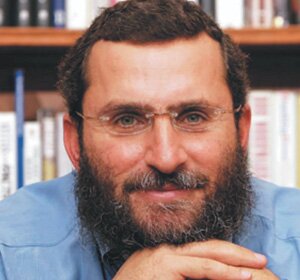| Rabbi Shmuley Boteach - Man on a spiritual mission |

|

|
|
He is perhaps the most recognisable rabbi in America to the mainstream. Some say he is an egomaniac. Others say he is obsessed with pop culture. With Shalom in the Home, his own internationally aired reality show growing in popularity, a radio show on the Oprah network and a laundry list of A-list stars as friends, Rabbi Shmuley Boteach in many ways was born out of mainstream American pop culture. In many ways he was not. He has become a household name. He has been labelled Dr. Ruth Weistheimer in a kippa or Dr. Phil, from the Oprah network, with a beard.
He, like many Americans, is the product of a broken home, a child of divorce. This event was a key factor behind his focus on the psychological needs of families. Through his popular show on the Learning Channel, based out of the United States but aired worldwide including Hong Kong and Singapore, he attempts to save people from the pain his own family suffered after his parent’s divorce. He tries to help put marriages and families back on track by teaching people to communicate, respect and value one another, and rediscover the passion and joy in their lives. He is very restless and exudes a seemingly endless energy. With the demanding schedule of his own television show and radio show, he also manages to be an extremely prolific writer, having authored some 19 best selling books. He is also an extremely devoted husband and the father of nine children, the youngest of which was born over the summer. Although his own parent’s divorce was now well over thirty years ago, it was certainly a very signifi cant factor in the path his career has taken. Divorce, he explains is an event that inevitably results in tremendous damage. When transformed into a positive force, it can drive people to take care to make extra efforts to secure and nurture their own personal relationships, but for Rabbi Shmuley it is much more than that. His sense of responsibility does not end with his own family. It merely begins there. He is a man on a mission. A mission he explains was appointed to him personally by the Chabad-Lubavitch Rebbe, Rabbi Menachem Mendel Schneersohn. This is where things really get interesting. If one were to focus only on his words, and take him out of the headlines, off the television set and away from his list of Hollywood-type A-list friends, his words mirror those of many Chabad-Lubavitch schluchim. He explains how around the time of his Bar Mitzvah, after having left his home to pursue study in yeshivah, he was granted a private audience with the Rebbe. This moment was his epiphany. He describes the unbelievable signifi cance and importance of having the Rebbe look directly at him and with his love and infi nite wisdom, make a promise that he would “grow to be a light for the Jewish people,†and he would “bring this light to the entire world.†When asked how he rationalises his seeemingly confl icting identities, between the worlds of the religious and mainstream pop culture, he insists that there are none. He is a Chabad-Lubavitcher doing the Rebbe’s work. At the age of 22, after being ordained, he was appointed by Chabad to serve as the spiritual leader at Oxford University, a position he served in for almost eleven years. In 1988, he founded the Oxford University L’Chaim Society. The L’Chaim society quickly grew in popularity amongst both Jews and non-Jews and it drew in speakers like Professor Richard Dawkins, Elie Wiesel, Simon Wiesenthal, Deepak Chopra, Professor Stephen Hawking and Mikhail Gobachev, to name just a few. He received much criticism for his tactics, choices of speakers, and decision to open the forum up to non-Jews. After inviting Yitzhak Rabin to speak, despite protests from the Chabad movement leadership, he was asked finally to leave his posting as schlicha, an appointment that most understand to be for life. According to Rabbi Shmuley, despite widespread rumours, there was no split between him and the Lubavitch movement. There was merely a difference between the expectations of the U.K. Chabad branch and the tactics he used to do the Rebbe’s work. He is still a Chabad Lubavitch and this is the movement in which he is raising his family. He notes that the L’Chaim Society, of which he was the founder, is a prototype that has grown in the Chabad Lubavitch movement and it is still immensely popular worldwide. He also adds that had he developed this forum in the United States, it would have gone on unchecked and uninterrupted as the controversy was more of a difference with U.K. Chabad and not Chabad in general. The inclusion of vast numbers of non-Jews into the L’Chaim Society’s activities and the invitation to sometimes controversial but always high profile speakers, from the religious to the secular to the profane, he insists was exactly on par with his mission to bring the light of the Jewish people to the world. The same holds true, he explains, for his hit television show which mainly focuses on the personal and everyday problems of non-Jews (over 90% of the applicants for his televised counselling services are non Jews). He is using Jewish wisdom and essential core Jewish values to touch others lives. Rabbi Shmuley reminds us that it is a Jewish value to place the utmost value on interpersonal relationships, and specifically on the relationship we have with family members. By reaching out to non-Jews and sharing Jewish wisdom, lessons that are applicable to all human beings, lessons that remind us how to prioritise our commitments and to have respect and consideration for our spouses and how to not take our family for granted, he is fulfi lling his role as a light of the Jewish people. He explains that since he has been able to reach out so successfully to non-Jews and pass on the basic lessons of humanity applicable to all religions, the Jews too will follow and embrace the Wisdom of our Fathers that our tradition has preserved. The question becomes why would non-Jews so easily accept a bearded Orthodox rabbi in a kippa? And why would anyone choose to air their ‘dirty laundry’ and their family’s problems on an internationally-aired television show? Rabbi Shmuley explains, “People are actually that desperate; that in need of help with their interpersonal relationships.†He is able to rely on core Jewish values to see the good in all people. He insists that he has been able to penetrate the mainstream because as Jews we are part of the mainstream culture. Our Jewish values are universal which is why they have stood the test of time. The Rebbe, in his wisdom, expressed the great desire to have this Jewish light permeate the world. And so Rabbi Shmuley will “G-d willing†continue on his mission of recording back-to-back episodes of his television show, taping his radio show for Oprah, appearing on countless international platforms and ‘rubbing elbows’ (so to speak) with the stars. And anyway, even if he attracts a bit of controversy along the way, “perfect people are boring,†he reminds. Supplied by Erica Lyons (Issue November 2008) |

















